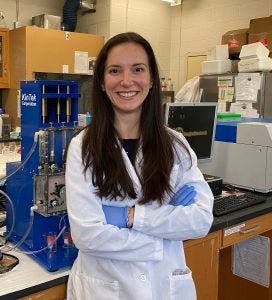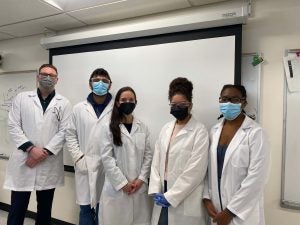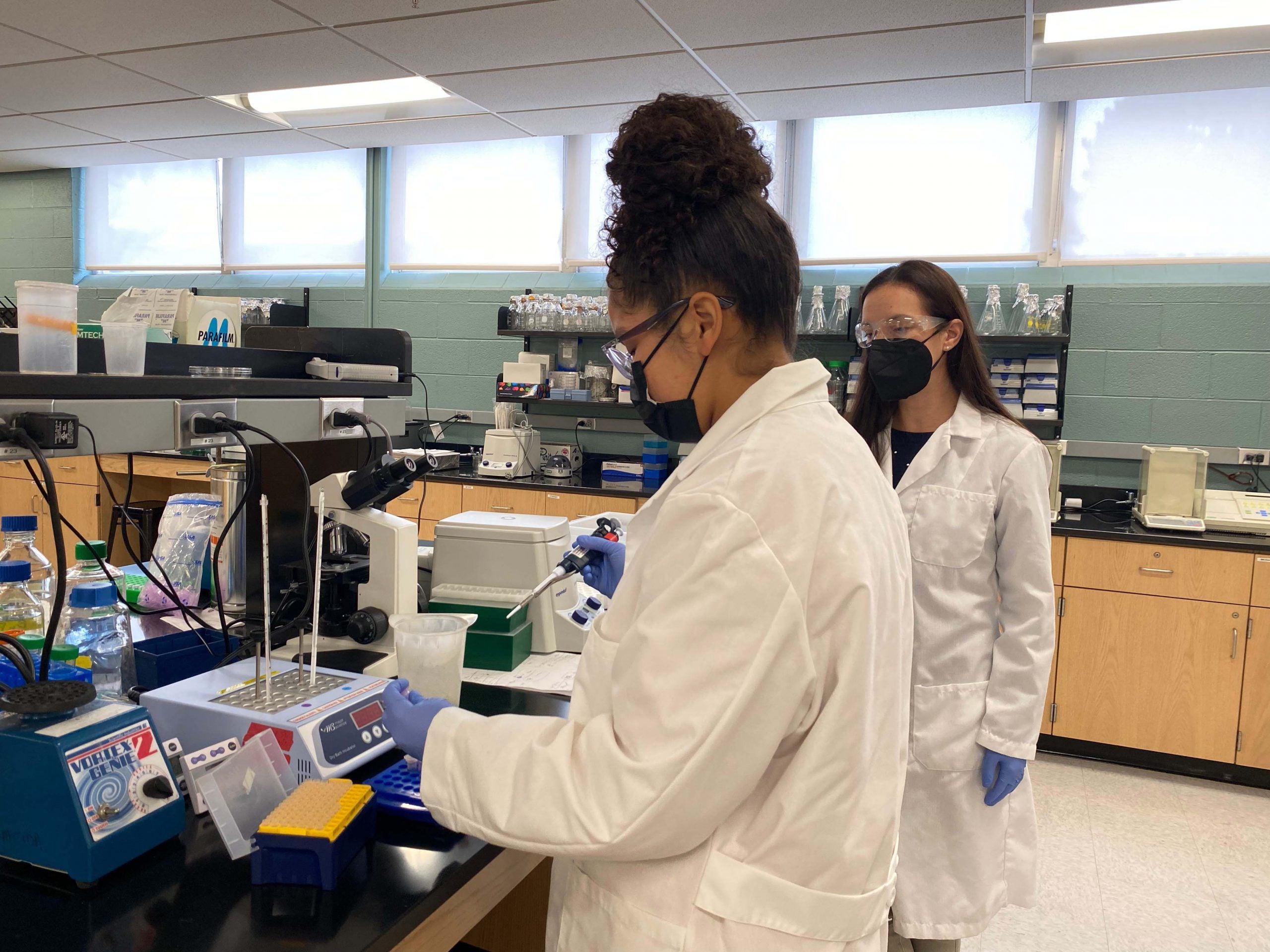
Dr. Jamie Towle-Weicksel’s Path to Funding
Dr. Jamie Towle-Weicksel, Associate Professor of Chemistry and Biochemistry at Rhode Island College (RIC), joined RIC in 2015 and received tenure and promotion to her current position in July 2019. Dr. Towle-Weicksel’s mentors encouraged her to apply to multiple grant opportunities, including RI-INBRE SURF Training and Early Career Development awards. As a result, she has mentored dozens of undergraduate students. We met with Jamie to learn more about her research, grants, and who has impacted her journey.
Jamie, please tell us who has mentored you and made an impact on your research.
Dr. Sarah Delaney, Professor of Chemistry at Brown University, works in a similar field of DNA as Towle-Weicksel and knew her postdoc advisor. Soon they formed a collaboration while working and teaching in Providence. Towle-Weicksel describes Delaney as “a strong sounding board…critical to her success, both scientifically and professionally.”
In May 2021 Towle-Weicksel received a one-year $100,000 INBRE/COBRE Administrative Supplement Award in collaboration with Dr. Eui Young So, a Research Assistant Professor at RI Hospital (RIH) and a COBRE for Skeletal Health & Repair investigator. Their award is
entitled “Nanoparticle-mediated drug delivery for inflammatory arthritis.” The goal of the award is to encourage collaborations by investigators supported by different Institutional Development Award (IDeA) funding initiatives while providing students a broad continuum of research opportunities. Jamie’s students learn and use state-of-the-art technology and have the opportunity to learn from clinical lab researchers at RIH.
In addition to the INBRE/COBRE award, Delaney mentored and encouraged Towle-Weicksel to apply for the NIH Academic Research Enhancement Award (AREA R15) that she received on September 21, 2021. The three-year $300,000 grant “Uncovering the Mechanistic Role of DNA Pol Theta in UV-Damage Repair” is significant for Towle-Weicksel who teaches full-time in addition to her research and service commitments. Delaney advised Towle-Weicksel “there’s never a good time” to apply for grants but pushed her to formulate new ideas and coached her through the application process. As a result, Towle-Weicksel has received her sixth award in six years, four of which have been granted by RI-INBRE!

Dr. Towle-Weicksel has mentored 20 students, noting that most RIC students pursue jobs in the biotech fields immediately after receiving their undergraduate degrees. Regardless of their academic or professional pursuits, she helps all students obtain relevant and transferable skills. Although graduate school may not be next, Towle-Weicksel counsels each student individually, focusing on what they hope to achieve through undergraduate research. She encourages her biochemistry students to pursue research careers, as most do not seek a Ph.D. Many students do not realize that paid research opportunities exist for undergraduates. RI-INBRE’s Summer Undergraduate Research Fellowship (SURF) program provided her students with funding, research, and professional development opportunities that they might not have engaged in otherwise. Resulting from RI-INBRE SURF and her other awards, some of Jamie’s students have worked with her throughout their undergraduate career, from general chemistry to graduation.
Towle-Weicksel’s tiered mentoring approach pairs senior students with a first- or second-year student, recognizing that undergraduate students are more comfortable learning alongside and from their peers, creating an inclusive and welcoming environment. Towle-Weicksel’s lab meetings ensure there is no hierarchy, “Everyone does the work,” she says, from washing glassware to asking for feedback there is no task above or below a member of her lab. Students work on individual projects but collaboratively support the research for their respective grants, gaining independent skills. Towle-Weicksel emphasized students must learn scientific maturity and feel supported. Her lab environment is rooted in partnership with research resulting in a group effort. Students can learn from their mistakes, such as making a buffer the wrong way, but understand what to do differently and how to ask for help when needed.
Who were your mentors?
During her undergraduate work at Worcester Polytechnic Institute, Towle-Weicksel participated in a summer research fellowship at UMass Chan Medical School under Mary Munson, Ph.D., who fostered a strong sense of independent learning and skill development. Melonnie Furgason, Ph.D., also mentored her in the Munson lab, a graduate student at the time and now Department Chair for Human Biology and Associate Professor of Molecular Biology at Kettering College in Ohio. Dr. David Thurlow, Jamie’s graduate mentor and advisor at Clark University, stressed “it’s not the destination, but the journey.” He was influential in Towle-Weicksel’s choice to teach at a PUI. William Royer, Ph.D., from UMass Medical School supported Towle-Weicksel through the many “I can’t do this” moments that biomedical students face in graduate school.

Why does mentorship matter?
Towle-Weicksel stressed the importance of mentors, networks, and the scientific community she is part of. From mentee to mentor, her style is steeped in lessons learned and advice that can make a difference. In her undergraduate years, the guidance she received was focused on boosting confidence, which included making mistakes and learning how to work independently. By graduate school, Jamie’s mentors encouraged her to pursue a research and professional career at a PUI. Now her mentors continue to support her career development and encourage her to apply for grants. Dr. Towle-Weicksel is thankful to Laura Bellavia and RI-INBRE for their support. In the past, Jamie’s lab faced many challenges. Students had to personally transport gels from RIC (Providence) to URI (Kingston) to conduct sequencing. Now her lab has the “life-changing equipment needed” to conduct sequencing, greatly reducing the need to transport research or rely on colleagues at other facilities.

Towle-Weicksel understands the challenges RIC students, and those who attend a PUI, face. She strives to help all students and doesn’t necessarily recruit the A-plus students for her lab. She enjoys working with students who may be struggling academically or personally to find their passion, develop their skills and techniques, and see themselves in a research career. Jamie recalled when “things clicked” for her during her undergraduate research. She understands the importance of providing the experience/opportunity to students that may doubt their capabilities, but she recognizes their potential regardless of their GPA. Jamie shared that while good grades and enrollment in courses and labs are foundational, it’s the hands-on, independent research that drives home the concepts, the “ah-ha” moments when it all connects.

In addition to SURF trainees, Jamie has mentored three McNair Scholars (for students from underrepresented segments of society). She encourages her students to attend local and national scientific research conferences, including the annual Society for Advancement of Chicanos/Hispanics and Native Americans in Science (SACNAS) conference. RI-INBRE funding has made it possible for Jamie to send students to conferences where they can present their research, network, and gain a stronger sense of community in STEM.
